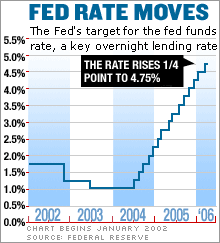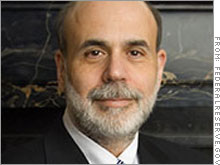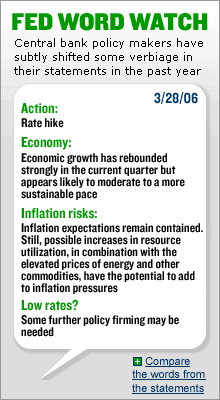Bernanke: Energy a threat
But Fed chief says the economy is healthy and that central bank may pause to assess new reports.
NEW YORK (CNNMoney.com) - Federal Reserve Chairman Ben Bernanke told Congress Thursday that record high oil prices remain a concern that could pose a risk to both economic growth and the inflation outlook. "Increases in energy prices have pushed up overall consumer price inflation over the past year or so," Bernanke said. But he added that the inflation outlook is "reasonably favorable."
Bernanke said the economy has rebounded "briskly" after Hurricane Katrina last year but warned the pace of growth would slow a bit as the year progresses. "The economy has been performing well and the near-term prospects look good," the new central bank chief told the Joint Economic Committee of Congress. Bernanke also said that further interest-rate rises will be "increasingly dependent" on economic data and policy-makers could at some point pause in their 22-month credit-tightening campaign to assess the outlook. Fed policy-makers "will continue to monitor the incoming data closely to assess the prospects for both growth and inflation. In particular, even if in the Committee's judgment the risks to its objectives are not entirely balanced, at some point in the future the Committee may decide to take no action at one or more meetings in the interest of allowing more time to receive information relevant to the outlook," he said. Fed policy-makers will meet on May 10 and are widely expected to raise the target for the federal funds rate by a quarter of a percentage point to 5 percent. The Fed has previously hinted that it's nearing an end to its rate-hiking campaign, which began in June 2004. The reaction to Bernanke's comments was positive on Wall Street. Stocks moved off their lows Thursday morning after Bernanke's remarks and headed higher as the morning progressed. Meanwhile, bonds rallied and reversed early losses, leaving the benchmark 10-Year Treasury note at about 5.05 percent, down from 5.12 percent earlier in the session. Bond prices and yields move in opposite directions. "The Fed is going to raise rates to 5 percent in May and after that it will be data dependent. There are no surprises here," said John Norris, chief economist and senior fund manager with Morgan Asset Management in Birmingham, Ala. "This just confirms what everyone's hopes were." Bernanke: Oil more of an inflationary problem
During a question and answer period, Bernanke stressed that the Fed would remain highly focused on keeping inflation in check. He pointed to economic research that indicated that recessions during the past two decades have been "less frequent and milder" thanks to the Fed's approach toward inflation. "The Federal Reserve has established credibility for keeping inflation low and stable," he said. In response to several questions about near record high prices for oil and gasoline, Bernanke said that the Fed was concerned about them but that higher oil prices were probably more of a threat for inflation than for causing an economic slowdown. "One issue we'll be looking at carefully is whether oil price increases pass through into core inflation, whether they go beyond the energy sector. If that were to happen, that would be very deleterious to the economy," he said. "If inflation is not affected by high oil prices, that would give the Fed more leeway," he said. Bernanke added that he did not see any reason for oil prices to head much lower any time soon. He said that a so-called windfall profit tax on oil companies, which has been discussed by some politicians, would probably not cause them to increase production. "Unfortunately nothing can be done to effect oil or gasoline prices in the short term," Bernanke said, adding that the reason oil prices have risen so sharply is simply due to supply and demand issues. He stressed that conservation and initiatives to find alternative sources of energy were needed to put downward pressure on oil and gas prices over the long haul. But when asked whether he was worried about the jump in price for gold and other commodities, Bernanke said he was not overly worried. He said that commodity prices were one of many things that he looks at when trying to ascertain the inflation outlook for the economy and that the spike in gold, as well as oil to a certain extent, probably had more to do with concerns about political tensions in the Middle East than inflation fears. "Certainly there are some fears about inflation. Clearly, a factor in the price of gold is global geopolitical uncertainty given what's going on in the world. Today, gold is seen as a safe haven investment," he said. Puzzled by slow wage growth
Bernanke said he did expect economic growth to show "slight slowing" this year due to the rising cost of energy. He also noted in his prepared remarks that "softening" in the housing market would also have an effect on growth. So far though, neither higher crude oil or concerns about the real estate market have appeared to have had a major negative impact on the economy. The government is set to announce gross domestic product (GDP) figures for the first quarter on Friday and economists are expecting GDP grew at a sizzling pace of about 5 percent, rebounding sharply from the fourth quarter. Nonetheless, Bernanke said it was "puzzling" that wage growth had not caught up with a boom in productivity in the U.S. economy. He added that higher wages may not necessarily be inflationary and that he hoped to see higher real wage growth in the future. With that in mind, David Wyss, chief economist with Standard & Poor's, said he hopes the Fed will not raise rates again following its May meeting because there hasn't been much evidence of inflation outside of oil. Wyss argues that the Fed still runs the risk of raising rates too aggressively and causing a more painful than necessary economic pullback in 2007. "It is rather encouraging that the Fed is pointing toward a pause after the May hike. A lot of us were getting concerned that the hikes would continue into June and August," Wyss said. "And one of the problems is that what the Fed does now affects the economy a year from now." The Fed chairman also said that he planned to stay on the path of his predecessor Alan Greenspan regarding increased openness at the central bank. During the past few years, the Fed, under Greenspan, was far easier to read and did a good job of telegraphing its interest rate moves to Wall Street. "We will continue Greenspan's movements toward greater transparency to reduce uncertainty in the financial markets," Bernanke said. "We have no desire of changing the basic operating procedure for the Fed." Steering clear of the tax debate
Several members of Congress tried to get Bernanke's thoughts on tax cuts in light of the federal budget deficit but Bernanke was cagey, almost in Greenspan-like fashion, when discussing taxes and the deficit. He said he did not think that tax cuts necessarily pay for themselves but that revenue losses associated with lower taxes could be offset by efficient use of resources by the government. "The issue as always is whether deficits should be adjusted on the tax side or the spending side and that decision should be left to Congress," he said, adding that proponents of lower taxes need to realize that federal spending has to be controlled while advocates of bigger government have to consider that taxes would need to be higher. ------------------- The latest economic read from the Fed: Click here.
More on the economy: Click here. |
| ||||||||||||||||||





